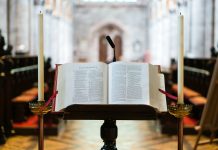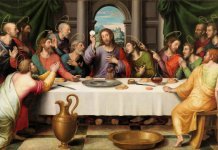The Epistle of Ignatius to the Magnesians
(sometimes simply shortened to Magnesians
) is one
of 7 authentic epistles by St. Ignatius of Antioch. The
other authentic epistles of Ignatius consist of 6 other
epistles to churches and 1 to his friend, St. Polycarp.
This epistle, like the others, was written soon before Ignatius’ eventual martyrdom in Rome.
Damas, the bishop of Magnesia, met with Ignatius in nearby Smyrna. Ignatius, in turn, wrote this thankful letter and entrusted it to Damas, his priests, and the Magnesian church.
The letter instructs Christians to celebrate the Lord’s Day each Sunday as opposed to the Jewish Sabbath on Saturdays. It also generally condemns the notion that Christians must live according to the Jewish law.
Ignatius exhorts the Magnesian faithful to submit to the presbytery and to Bishop Damas, even though Damas is young.
Date: around 110 AD.
Greeting
Ignatius, who is also called Theophorus, to the blessed in the grace of God the Father, in Jesus Christ our Saviour, in whom I salute the church which is at Magnesia, near the Moeander, and wish it an abundance of happiness in God the father, and in Jesus Christ.
Chapter 1: Reason for Writing the Epistle
Having been informed of your godly love, so well-ordered, I rejoiced greatly, and determined to commune with you in the faith of Jesus Christ.
For being counted worthy to bear a most godly name, in these bonds which I carry about, I commend the churches, and I pray that there may be in them union of the flesh and of the spirit which are Jesus Christ’s, our constant source of life—a union of faith and love, to which nothing is to be preferred. And, what is more than all, a union with Jesus and the Father, in whom, if we endure all the assaults of the prince of this world, and escape them, we shall enjoy God.
Chapter 2: I Rejoice in Your Messengers
Since then, I have had the privilege of seeing you, through Damas your most worthy bishop, and through your worthy presbyters Bassus and Apollonius, and through my fellow-servant the deacon Sotio, whose friendship may I ever enjoy, inasmuch as he is subject to the bishop as to the grace of God, and to the presbytery as to the law of Jesus Christ.
Chapter 3: Honour Your Youthful Bishop
Now it becomes you also not to treat your bishop too familiarly on account of his youth, but to yield him all reverence, having respect to the power of God the Father, as I have known even holy presbyters do, not judging rashly, from the manifest youthful appearance of their bishop, but as being themselves prudent in God, submitting to him, or rather not to him, but to the Father of Jesus Christ, the bishop of us all.
It is therefore fitting that you should, after no hypocritical fashion, obey your bishop, in honour of Him who has wired us to do, since he that does not, deceives not the bishop that is visible, but mocks Him who is invisible. And all such conduct has reference not to man, but to God, who knows all secrets.
Chapter 4: Some Wickedly Act Independently of the Bishop
It is fitting, then, not only to be called Christians, but to be so in reality: as some indeed give one the title of bishop, but do all things without him.
Now such persons seem to me not possessed of a good conscience, seeing they are not steadfastly gathered together according to the commandment.
Chapter 5: Death Is the Fate of All Such
Seeing then, all things have an end, these two things are simultaneously set before us—death and life; and every one shall go unto his own place.
For as there are two kinds of coins, the one of God, the other of the world, and each of these has its special character stamped upon it, so is it also here.
The unbelieving are of this world; but the believing have, in love, the character of God the Father by Jesus Christ, by whom, if we are not in readiness to die into His passion, His life is not in us.
Chapter 6: Preserve Harmony
Since therefore I have, in the persons mentioned before, beheld the whole multitude of you in faith and love, I advise you to be zealous in doing all things in godly concord, while your bishop presides in the place of God, and your presbyters in the place of the assembly of the apostles, along with your deacons, who are most dear to me, and are entrusted with the ministry of Jesus Christ, who was with the Father before the beginning of time, and in the end was revealed.
Do you all then, imitating the same divine conduct, pay respect to one another, and let no one look upon his neighbour after the flesh, but continually love each other in Jesus Christ.
Let nothing exist among you that may divide you; but be united with your bishop, and those that preside over you, as a type and evidence of your immortality.
Chapter 7: Do Nothing without the Bishop and Presbyters
As therefore the Lord did nothing without the Father, being united to Him, neither by Himself nor by the apostles, so neither do anything without the bishop and presbyters.
And don’t attempt to think anything right for yourselves apart from others: but let there be one prayer in common, one supplication, one mind, one hope, in love and in joy unblameable, which is Jesus Christ, than whom nothing is more excellent.
Hasten to come together all of you, as to one temple, even God; as to one altar, even to one Jesus Christ, who came forth from One Father and is with One and departed unto One.
Chapter 8: Caution against False Doctrines
Be not deceived with strange doctrines, nor with old fables, which are unprofitable. For if we still live according to the Jewish law, we acknowledge that we have not received grace.
For the divinest prophets lived according to Christ Jesus. For this cause also they were persecuted, being inspired by His grace to the end that they which are disobedient might be fully persuaded that there is one God who manifested Himself through Jesus Christ His Son, who is His Word that proceeded from silence, who in all things was well-pleasing unto Him that sent Him.
Chapter 9: Let Us Live with Christ
If then those who had walked in ancient practices attained unto newness of hope, no longer observing sabbaths but fashioning their lives after the Lord’s day, on which our life also arose through Him and through His death which some men deny—a mystery whereby we attained unto belief, and for this cause we endure patiently, that we may be found disciples of Jesus Christ our only teacher—if this be so, how shall we be able to live apart from Him? Seeing that even the prophets, being His disciples, were expecting Him as their teacher through the Spirit. And for this cause He whom they rightly awaited, when He came, raised them from the dead.
Chapter 10: Beware of Judaizing
Let us not, therefore, be insensible to His kindness. For were He to reward us according to our works, we should cease to be.
Therefore, having become His disciples, let us learn to live according to the principles of Christianity. For whoever is called by any other name besides this, is not of God.
Lay aside, therefore, the evil, the old, the sour leaven, and be changed into the new leaven, which is Jesus Christ. Be salted in Him, unless anyone among you should be corrupted, since by your taste you shall be proved.
It is absurd to profess Christ Jesus and to Judaize. For Christianity did not embrace Judaism, but Judaism Christianity, that so every tongue which believes might be gathered together to God.
Chapter 11: I Write These Things to Warn You
These things I address to you, my beloved, not that I know any of you to be in such a state; but, as less than any of you, I desire to guard you beforehand, that you fall not upon the hooks of vain doctrine, but that you attain to full assurance in regard to the birth, and passion, and resurrection which took place in the time of the government of Pontius Pilate, being truly and certainly accomplished by Jesus Christ, who is our hope, from which may no one of you ever be turned aside.
Chapter 12: You Are Superior to Me
May I enjoy you in all respects, if indeed I be worthy! For though I am bound, I am not worthy to be compared to any of you that are at liberty.
I know that you are not puffed up, for you have Jesus
Christ in yourselves. And all the more when I commend you,
I know that you only feel the more shame; as it is
written, The righteous man is his own accuser.
Chapter 13: Be Established in Faith and Unity
Study, therefore, to be established in the doctrines of the Lord and the apostles, that so all things, whatever you do, may prosper both in the flesh and spirit; in faith and love; in the Son, and in the Father, and in the Spirit; in the beginning and in the end; with your most admirable bishop, and the well-compacted spiritual crown of your presbytery, and the deacons who are according to God.
Be subject to the bishop, and to one another, as Jesus Christ to the Father, according to the flesh, and the apostles to Christ, and to the Father, and to the Spirit; that so there may be a union both of flesh and of spirit.
Chapter 14: Your Prayers Requested
Knowing as I do that you are full of God, I have but briefly exhorted you.
Be mindful of me in your prayers, that I may attain to God; and remember also the church which is in Syria, whereof I am not worthy to be called a member. For I stand in need of your united prayer in God, and your love, that the church which is in Syria may be deemed worthy of being refreshed by your church.
Chapter 15: Salutations
The Ephesians from Smyrna salute you, from whence I also write to you. They are here with me for the glory of God, as you also are, and they have comforted me in all things, together with Polycarp, bishop of the Smyrnaeans.
The rest of the churches, in honour of Jesus Christ, also salute you.
Fare you well in the harmony of God, you who have obtained the inseparable Spirit, who is Jesus Christ.

















